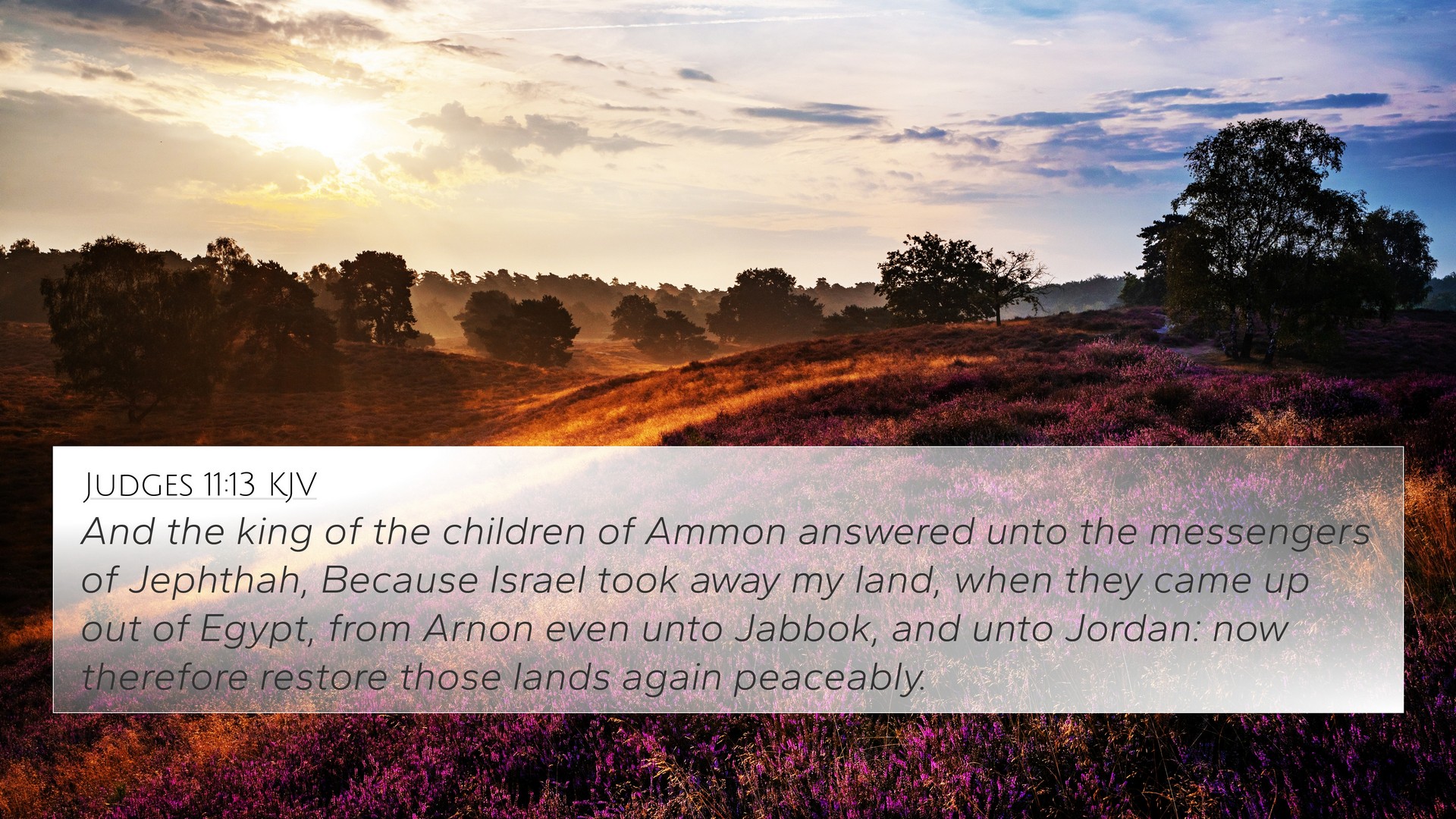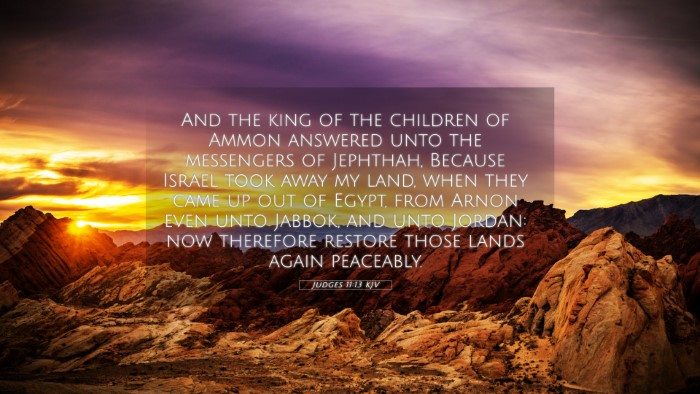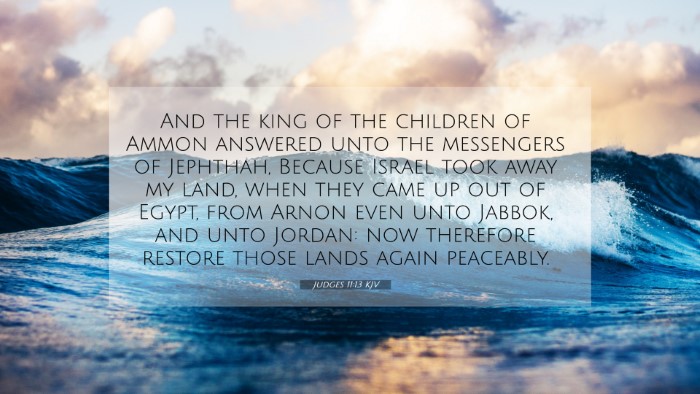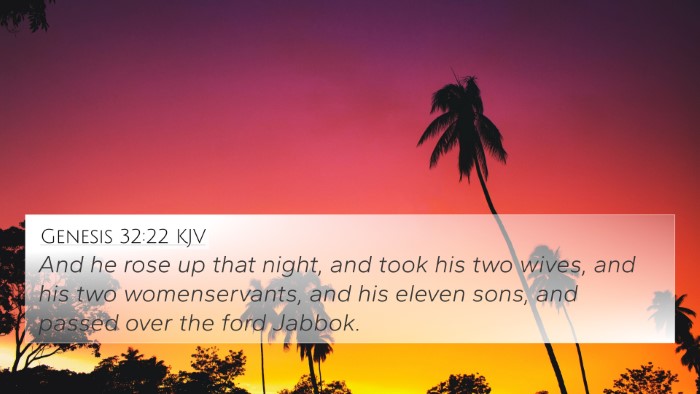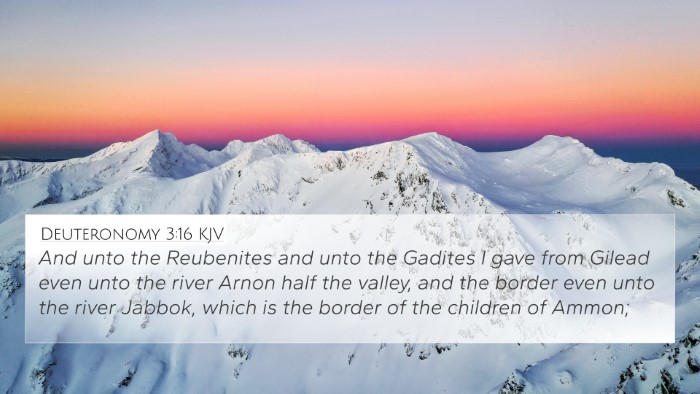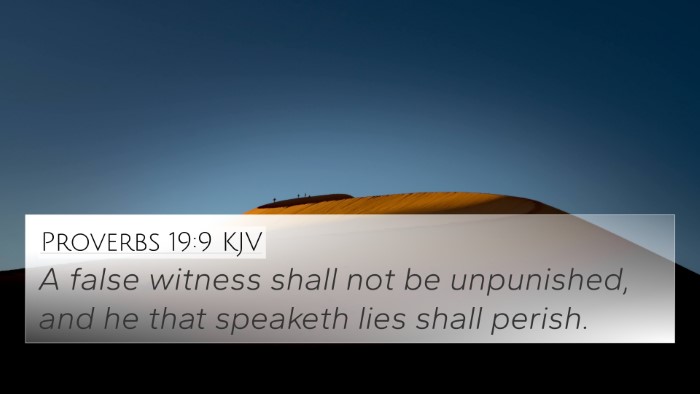Understanding Judges 11:13
Judges 11:13 states:
“And the king of the children of Ammon answered unto the messengers of Jephthah, Because Israel took away my land, when they came up out of Egypt, from Arnon even unto Jabbok, and unto Jordan: now therefore restore those lands again peaceably.”
Verse Summary
This verse describes the response of the king of Ammon to Jephthah’s inquiry regarding the conflict between Israel and Ammon. The king claims that Israel has taken land that rightfully belongs to the Ammonites, asserting a historical grievance linked to Israel’s exit from Egypt and their subsequent conquest of Canaan.
Interpretation and Insights
Various public domain commentaries provide insights into this verse:
Matthew Henry's Commentary
Matthew Henry emphasizes the king of Ammon’s appeal to historical rights, showcasing a pattern of conflict rooted in territorial claims. Henry notes that this argument illustrates the cyclical nature of disputes between nations, echoing the broader narrative of Israel's conquests and the animosities that arise from them.
Albert Barnes' Notes on the Bible
Albert Barnes provides a detailed analysis of the geographical locations mentioned, such as Arnon and Jabbok, which were critical to the territorial claims made by Ammon. He explains that understanding these areas enables readers to grasp the legitimacy of the king’s assertion and the significance of land in ancient Near Eastern politics.
Adam Clarke's Commentary
Adam Clarke points out that the claim made by the king of Ammon is not only historical but also reflects a theological dimension. He suggests that the king’s demands were further complicated by the divine mandate given to Israel concerning the land. Clarke highlights that this tension serves as a backdrop for understanding God’s plans and Israel’s responsibilities in the Promised Land.
Cross-References
This verse connects with several other Bible passages, enriching its meaning through scriptural cross-referencing:
- Numbers 21:24-25: Israel’s conquest of the Amorites and the implications of territorial gains.
- Deuteronomy 2:19: Israel’s instructions regarding the lands of the Ammonites.
- Joshua 12:2: The geographical boundaries relevant to the territories claimed by Israel.
- Joshua 13:25: The specific mention of Ammon as part of the territory that had a claim against Israel.
- Judges 10:9: The earlier subjection of the Israelites to the Ammonites, illustrating the historical backdrop.
- 1 Samuel 11:1: A later conflict involving the Ammonites and their ongoing desire for territorial claims.
- Micah 6:5: Reflects on the history between Israel and Ammon, hinting at the historical grievances.
Thematic Connections
Judges 11:13 illustrates several themes prevalent throughout the Bible:
- Claims to Land and Identity: As seen in both Old and New Testaments, disputes over land correlate directly to national identity and divine promises.
- Historical Narratives: The importance of recounting history serves as both justification and warning within scriptural texts.
- Divine Mandate versus Human Action: The tension between God’s commands regarding land and human interpretations of those commands plays a critical role throughout biblical history.
- Conflict and Resolution: The ongoing struggle portrayed between Israel and surrounding nations illuminates the broader themes of conflict resolution found in scripture.
Researching Cross-References
For those interested in delving deeper into biblical cross-references:
- Utilize a Bible concordance to find related verses easily.
- Employ a Bible cross-reference guide for thematic studies.
- Consider Bible chain references for understanding connections among scriptures.
- Incorporate tools and resources for comparative Bible verse analysis to enhance your study of interconnected passages.
Conclusion
Judges 11:13 showcases the complexities of territorial claims and the associated historical and theological considerations. By leveraging cross-referencing and understanding the context through commentaries, readers can glean deeper meanings and appreciate the intricate web of connections within the biblical narrative.
